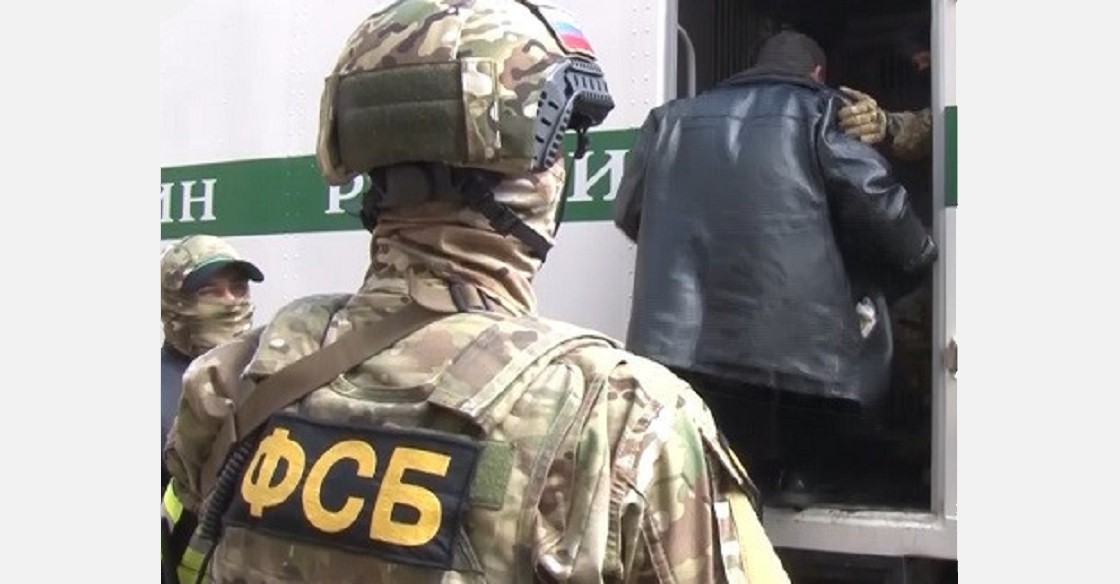Five days ago (April 29), the Federal Security Service (FSB) reported it had arrested 16 members of a Ukrainian “neo-Nazi community” in Irkutsk, Krasnodar, Saratov, Tambov, Tyumen, Chita, Anapa and Pereslavl-Zalessky. The Russian security service said that members of this group were involved in assaults on civilians and propagandizing extremism and were in the process of “preparing attacks on civilians and blowing up the administrative buildings of the organs of power.” All of them were described as heavily armed. Furthermore, the FSB contended it had evidence showing that this group’s operations were being coordinated by someone in Ukraine (ForPost, April 30).
These arrests follow the detention of 14 other ethnic Ukrainians living in Russia for similar crimes in mid-March (ForPost, March 19) and of still more ethnic Ukrainians in Voronezh, accused of recruiting ethnic Russians and preparing to attack Russian police. The last group supposedly targeted officers involved in enforcing Russian law against local pro–Alexei Navalny demonstrations. According to the FSB, both the Ukrainians and their Russian recruits were being armed and directed by Ukrainian intelligence agencies. Moreover, in reporting this, Sevastopol-based journalist Daniil Chernyk suggests Kyiv is acting on behalf of Western intelligence services, which purportedly see such ethnic organizations as a useful adjunct to their supposed promotion of Islamist cells in Russia (ForPost, February 19).
It is not difficult to imagine a scenario under which the Kremlin might repeat what it has been accused of doing in 1999, when, according to many respected independent experts, security services operatives blew up apartment blocks in two Russian cities and then blamed the Chechens in order to justify a new war against Chechnya (John Dunlop The Moscow Bombings of September 1999: Examinations of Russian Terrorist Attacks at the Onset of Vladimir Putin’s Rule, Stuttgart, 2014).
Today, at least some Ukrainians are thinking along those lines. One who has talked openly about this possibility is Apostrophe journalist Volodymyr Shevchuk (Apostrophe, May 1). He says that the Russian threat to Ukraine has in no way disappeared despite the withdrawal of at least some of the amassed Russian forces from the border areas in recent weeks (see EDM, April 27). Even as that pullback was occurring, he points out, “the Kremlin’s special services were presenting Ukraine as ‘a terrorist state’ ” and suggesting that Kyiv was organizing terrorist groups from among ethnic Ukrainians in Russian-occupied Crimea and in the Russian Federation as well. Indeed, he notes, at the height of the crisis, Russian Security Council Secretary Nikolai Patrushev openly accused the Ukrainian government of preparing “diversionists and terrorists” to operate inside Russia (Newssky.com.ua, April 16). The recent arrests provide an opportunity for Moscow to orchestrate provocations and then blame Ukraine, he says.
Ukrainian Major General Vasily Vovk has been even more explicit. He says that “under current conditions, there is the threat that Russians will initiate a terrorist act or its preparation” on Russian territory, blame it on ethnic Ukrainians and Kyiv, and then use that manufactured tragedy to mobilize Russian public opinion in favor of a new military operation against Ukraine (Apostrophe, March 18).
If Moscow does decide to take such an action, its narrative would also almost certainly include references to three other key developments.
- As Moscow reported last week, Ukrainians living in the Russian Federation formed 60 percent of those foreigners taking Russian citizenship. Obviously, Ukrainians who have such papers would find it far easier to move about internally than the rest of the almost two million who have arrived to Russia since 2014. At the same time, about two million ethnic Ukrainians have notably been Russian citizens since birth (TASS, May 1).
- Moscow has already expressed alarm that Kyiv has been stepping up its attention not only to ethnic Ukrainians in the Russian Federation (communities Kyiv has been interested in since 1991) but also to all non-Russians. Indeed, Verkhovna Rada (Ukrainian parliament) deputies are now calling on the Ukrainian government to devote even more attention to these groups than heretofore (Idelreal.org, April 24, 2021; Windowoneurasia2.blogspot.com, August 26, 2018).
- Moscow’s spokespeople can point to the numerous Ukrainian commentators who have talked about the need for Ukraine to be ready to seize parts of the Russian Federation when that country eventually disintegrates. The Russian government has already called attention to such rhetoric within the context of ethnic-Ukrainian participation in the Khabarovsk demonstrations last year as well as the existence of an ethnic-Ukrainian majority in what the Russians call the Kurile Islands (Glavred.info, April 21, 2021; Region.expert, August 18, 2020; Regnum, June 9, 2018).
Read More:
- Putin failed to achieve his 3 goals in Ukraine because he’s not ready to launch a major war, Polish analyst says
- Threat of major Russian military operation against Ukraine and West hasn’t disappeared, Felgengauer says
- Meeting one-on-one with Putin: A reckless adventure for Zelenskyy
- Official data prove Russia funnelled trainloads of ammo and fuel to occupied Donbas in early 2015
- (No) right to a fair trial, or a manual to Russia’s conveyor of repressions in Crimea
- Escalation around Donbas: Is the Ukrainian army prepared for full-scale Russian aggression?
- Russia closing off more of Black Sea even as it pulls its land forces back from Ukrainian border
- Putin may have pulled back from Ukraine border but he did not back down, experts warn




